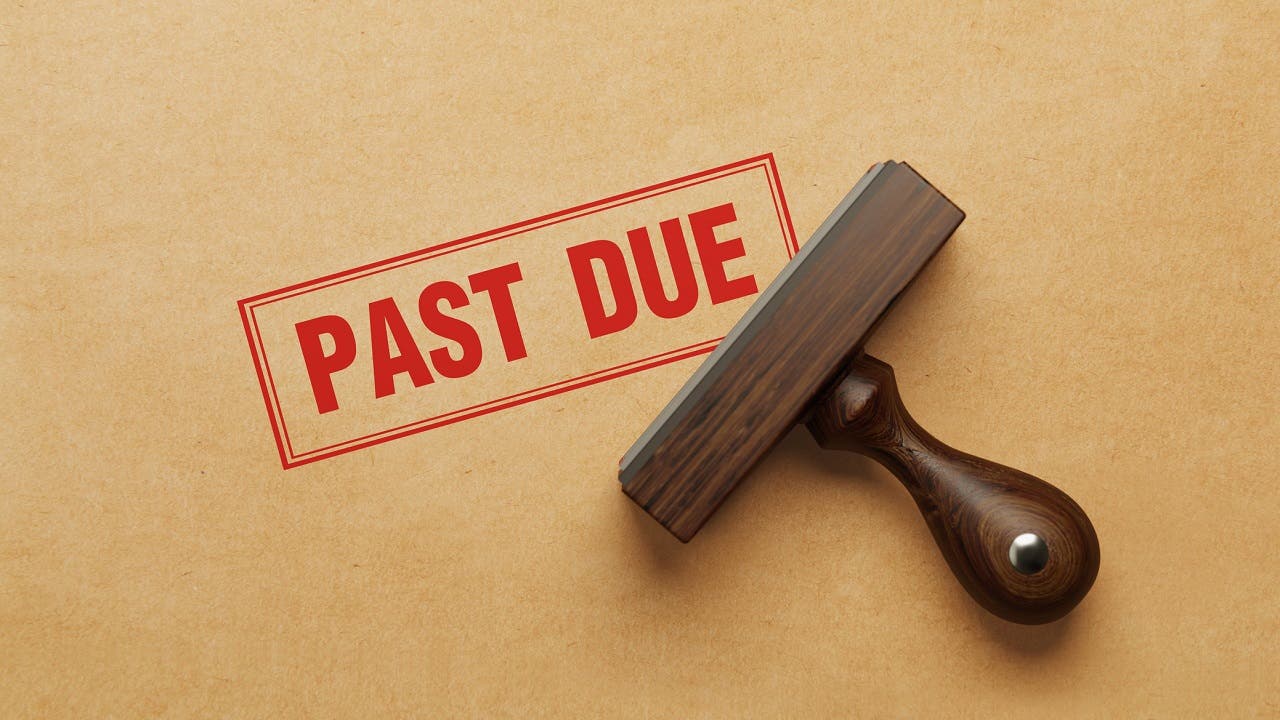What is a delinquent account?

The Bankrate promise
At Bankrate we strive to help you make smarter financial decisions. While we adhere to strict , this post may contain references to products from our partners. Here's an explanation for .
Key takeaways
- When you don't make a payment on a debt for over 30 days your debt will be reported to the credit bureaus as delinquent.
- Delinquent debt will hurt your credit score and will stay on your credit report for up to seven years.
- There are resources, like debt relief companies and non-profit credit counselors, that can help guide borrowers through the process of repaying delinquent balances.
When you borrow money, your lender will give you a timeline of when you need to pay back the cash. Student loans, credit cards, mortgages and auto loans – all of these come with the expectation that you will submit a minimum monthly payment prior to a certain deadline. As long as you make the cutoff for those payments, your account will be in good standing.
However, if the deadline passes and you don’t make the required payments, you’ll wind up with a delinquent account. As you work to maintain your financial wellbeing, it’s important to understand what is classified as delinquent, what it means for your credit score and what to do to avoid serious consequences.
What is a delinquent account?
When you hear the word delinquent used to describe a person, you’ll typically associate it with someone who has broken the law. In the financial world, being delinquent is similar: The borrower has broken the terms of his or her contract and hasn’t paid the money back during the agreed upon repayment term.
Different levels of delinquency come with different consequences. A delinquent account might come with something as simple as a late fee or can be as severe as losing your house or your car.
When is a borrower reported as delinquent?
There is a difference between being delinquent – which you technically are as soon as the payment deadline is past – and being reported as delinquent.
If you miss a payment that is due today but manage to submit it tomorrow, your account will likely not be reported to any of the credit bureaus. You may need to pay a late fee — although the fee may be waived if it’s your first missed payment.
Some types of loans offer more generous buffers for reporting delinquencies. For example, student loan borrowers with federal student loans aren’t reported as delinquent until they have failed to make payments for 90 days.
Here’s a general delinquency timeline and the consequences you could face based on the time that’s passed since your last payment.
| Time since last payment | Consequence |
|---|---|
| Less than 30 days | You will likely pay a late fee that will depend on the amount of the loan. |
| More than 30 days | You will pay a late fee, plus a report will be set to the three major credit bureaus. This will impact your credit score and will remain on your credit report for seven years. |
| More than 60 days | You will pay more late fees and receive phone calls and letters notifying you of the delinquent payments. |
| More than 90 days | Your account may be closed if it’s a credit card or personal loan, and if it’s a home or auto loan, you could receive a notice of the intention to foreclose or repossess the vehicle. |
| More than 120 days | Your name is passed on to a debt collection agency, and you can expect aggressive communication from the agency. If the debt is backed by collateral, like your home or your car, you may be close to losing that property. |
How does a delinquent account affect your credit score?
One of the most critical pieces of your credit score is maintaining a history of on-time payments. In fact, your payment history makes up 35 percent of your FICO score. That being said, delinquencies that extend past the 30-day mark can cause your score to take a serious hit.
Being a couple of months late might not seem like a big deal, but the impact of late payments can impact your finances for years down the road — seven years, to be exact.
So, if your credit card account is reported as delinquent in November 2023, you’ll be dealing with those negative marks on your credit until November 2030. This could impact your ability to get approved for future loans and lending opportunities. For example, you may have a hard time getting approved for a mortgage and if you do, the rates are more likely to be higher.
How can you avoid delinquent accounts?
There are multiple actions you can take if one of your accounts is in danger of falling into delinquent status. Taking action as soon as possible is key when protecting your credit score and financial future.
Consolidate your debts
If you’re carrying debt across multiple accounts, you can look into debt consolidation loans. These will consolidate your debts into one loan, so rather than juggling different payment dates for all your accounts, you’ll make one payment each month.
Only consolidate if you’re offered a lower interest rate on your new loan than what you had on your previous loans. Otherwise, you could end up paying more in fees and interest than what you previously were paying.
Tap into your emergency savings account
While an emergency savings account is designed for unexpected situations, that backup cash can play an important role in keeping your account in good standing. If you do use it to pay down this month’s debt, replenish your emergency fund as soon as possible and reevaluate your budget to prevent it from happening again.
Talk to your lender before the payment date arrives
If the payment due date is looming, call your lender. In many cases, you may be able to qualify for a hardship program. Most lenders offer this benefit on the basis of an unexpected loss of income or situation, like a job loss or a medical emergency. By proactively asking for assistance, it may demonstrate that you’re doing all you can to avoid delinquency.
Look at your budget
What expenses can you eliminate this month to create more wiggle room in the budget? Are there memberships or subscriptions that you can cancel to free up more room for your debt payments?
Look at your necessary expenses versus your ancillary spending to see if there’s anything you can cut for the time-being.
Look for debt and credit counseling
The National Foundation for Credit Counseling is a non-profit organization that can help connect borrowers with counseling services to develop strategies for getting on a better financial path. These services can be especially valuable if you’re struggling to make ends meet and are having difficulties paying down your debt.
Consider a debt relief company
If you have exhausted all your options, you may need to hire some help. Debt relief companies can help you avoid the last resort of bankruptcy by negotiating your debts for a smaller payoff.
However, these companies aren’t free. You’ll pay for their services, and some of these companies can be a bit shady. Beware of television advertisements with too-good-to-be-true promises of the ability to eliminate all your debts immediately.
What should you do to remove delinquent accounts from your credit report?
If you wind up with a delinquent account, here’s a rundown of how to get that bad mark removed from your credit report.
- Write to your lender: If your missed payment was a one-time rarity, consider contacting your lender. While help isn’t guaranteed, a personal letter that details your situation might be able to go a long way.
- Write to the credit bureaus: If it’s been seven years since your delinquency, the time is up. Review your credit report. If the negative mark is still there, send a letter to each of the three credit bureaus with a request to have it removed.
- Manage the rest of your credit responsibly: Getting delinquent accounts removed can be tough. If you’re stuck with the mark on your credit report, focus on what’s in your control. Making on-time payments on your other bills, limiting your credit inquiries and paying down debt can help you improve your score.
Bottom line
Late payments and delinquent accounts can hurt your finances and hold you back financially for years down the road. As you work to build your credit history, keeping all your credit accounts in good standing will lay the foundation for your long-term success.
If you’re overwhelmed by your current bills, now is the time to educate yourself on debt management strategies. Take advantage of the resources at your disposal so you can enjoy a debt-free – and stress-free – future.
Related Articles



